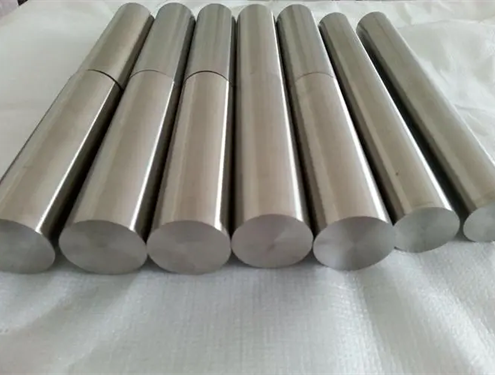Application scope and performance of GR5 titanium alloy
Application scope and performance of GR5 titanium alloy
GR5 titanium alloy is also known as TC4 titanium alloy. We also call it 6Al4V. This is the most widely used titanium metal. It is usually referred to as the GR5 titanium alloy we use. It has good reach and extension.
Titanium and its alloys have many excellent properties such as lightweight, high strength, strong heat resistance, and corrosion resistance. They are known as the “metal of the future” and are new structural materials with promising development prospects. Titanium and its alloys not only have very important applications in the aviation and aerospace industries, but have also been widely used in many industrial sectors such as the chemical industry, petroleum, light industry, metallurgy, and power generation. Titanium can resist corrosion of the human body and does not harm the human body. Therefore it can be widely used in the medical and pharmaceutical industry sectors. Titanium has good suction properties and is widely used in electronic vacuum technology and high vacuum technology.

Top ten properties of GR5 titanium alloy
1. Low density and high specific strength
The density of titanium metal is 4.51g/cubic centimeter, which is higher than aluminum and lower than steel, copper, and nickel, but its specific strength ranks first among metals.
2. Corrosion resistance
Titanium is a very active metal with a very low equilibrium potential and a high tendency of thermodynamic corrosion in the medium. But in fact, titanium is very stable in many media. For example, titanium is corrosion-resistant in oxidizing, neutral and weakly reducing media. This is because titanium has a great affinity with oxygen. In air or oxygen-containing media, a dense, highly adhesive, and inert oxide film is formed on the titanium surface, which protects the titanium matrix from corrosion. Even due to mechanical wear and tear, it will quickly heal itself or regenerate. This shows that titanium is a metal with a strong tendency to passivate. The titanium oxide film always maintains this characteristic when the medium temperature is below 315°C.
To improve the corrosion resistance of titanium, surface treatment technologies such as oxidation, electroplating, plasma spraying, ion nitridation, ion implantation, and laser processing have been developed to enhance the protection of the titanium oxide film and obtain the desired corrosion resistance. Effect. In response to the need for metal materials in the production of sulfuric acid, hydrochloric acid, methylamine solution, high-temperature wet chlorine, and high-temperature chloride, a series of corrosion-resistant titanium alloys such as titanium-molybdenum, titanium-palladium, titanium-molybdenum-nickel, etc. have been developed. Titanium-32 molybdenum alloy is used for titanium castings, titanium-0.3 molybdenum-0.8 nickel alloy is used for environments where crevice corrosion or pitting corrosion often occurs, or titanium-0.2 palladium alloy is used for parts of titanium equipment, both of which have been well used. Effect.
3. Good heat resistance
The new titanium alloy can be used for a long time at temperatures of 600°C or higher.
4. Good low-temperature resistance
The strength of low-temperature titanium alloys represented by titanium alloys TA7 (Ti-5Al-2.5Sn), TC4 (Ti-6Al-4V), and Ti-2.5Zr-1.5Mo increases as the temperature decreases, but the plasticity does not change. big. It maintains good ductility and toughness at low temperatures of -196-253°C, avoiding the cold brittleness of metal. It is an ideal material for low-temperature containers, storage boxes, and other equipment.
5. Strong anti-dumping performance
After titanium metal is subjected to mechanical vibration and electrical vibration, its own vibration attenuation time is the longest compared with steel and copper metals. This property of titanium can be used as tuning forks, vibration components of medical ultrasonic pulverizers, and vibration films of high-end audio speakers.
6. Non-magnetic and non-toxic
Titanium is a non-magnetic metal and will not be magnetized in a large magnetic field. It is non-toxic and has good compatibility with human tissue and blood, so it is used by the medical community.
7. Tensile strength is close to its yield strength
This property of titanium shows that its yield-strength ratio (tensile strength/yield strength) is high, indicating that titanium metal materials have poor plastic deformation during forming. Due to the large ratio of titanium’s yield limit to elastic modulus, titanium has a large resilience during molding.
8. Good heat exchange performance
Although the thermal conductivity of titanium metal is lower than that of carbon steel and copper, due to titanium’s excellent corrosion resistance, the wall thickness can be greatly reduced, and the heat exchange method between the surface and steam is dropwise condensation, which reduces the heat group and is too superficial. No scaling can also reduce thermal resistance, significantly improving the heat transfer performance of titanium.
9. Low elastic modulus
The elastic modulus of titanium is 106.4GPa at room temperature, which is 57% of steel.
10. Suction performance
Titanium is a metal with very active chemical properties and can react with many elements and compounds at high temperatures. GR5 titanium alloy breathing mainly refers to the reaction with carbon, hydrogen, nitrogen, and oxygen at high temperatures.


